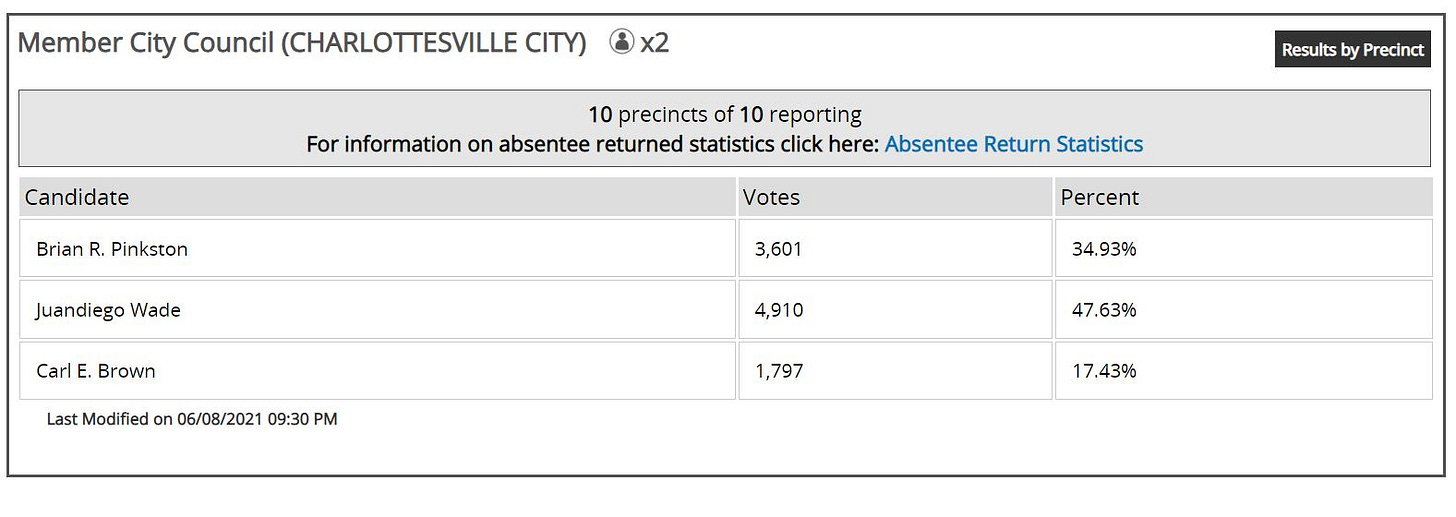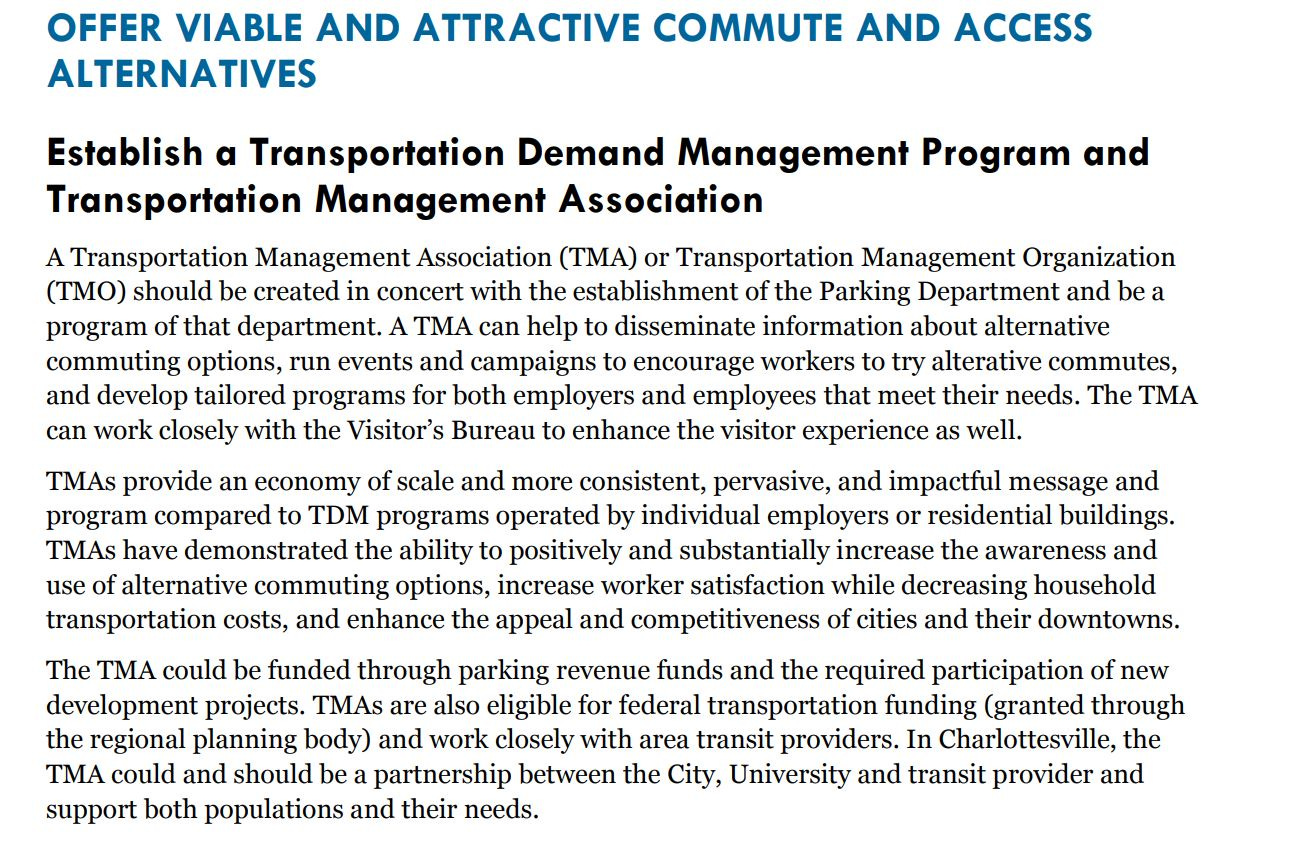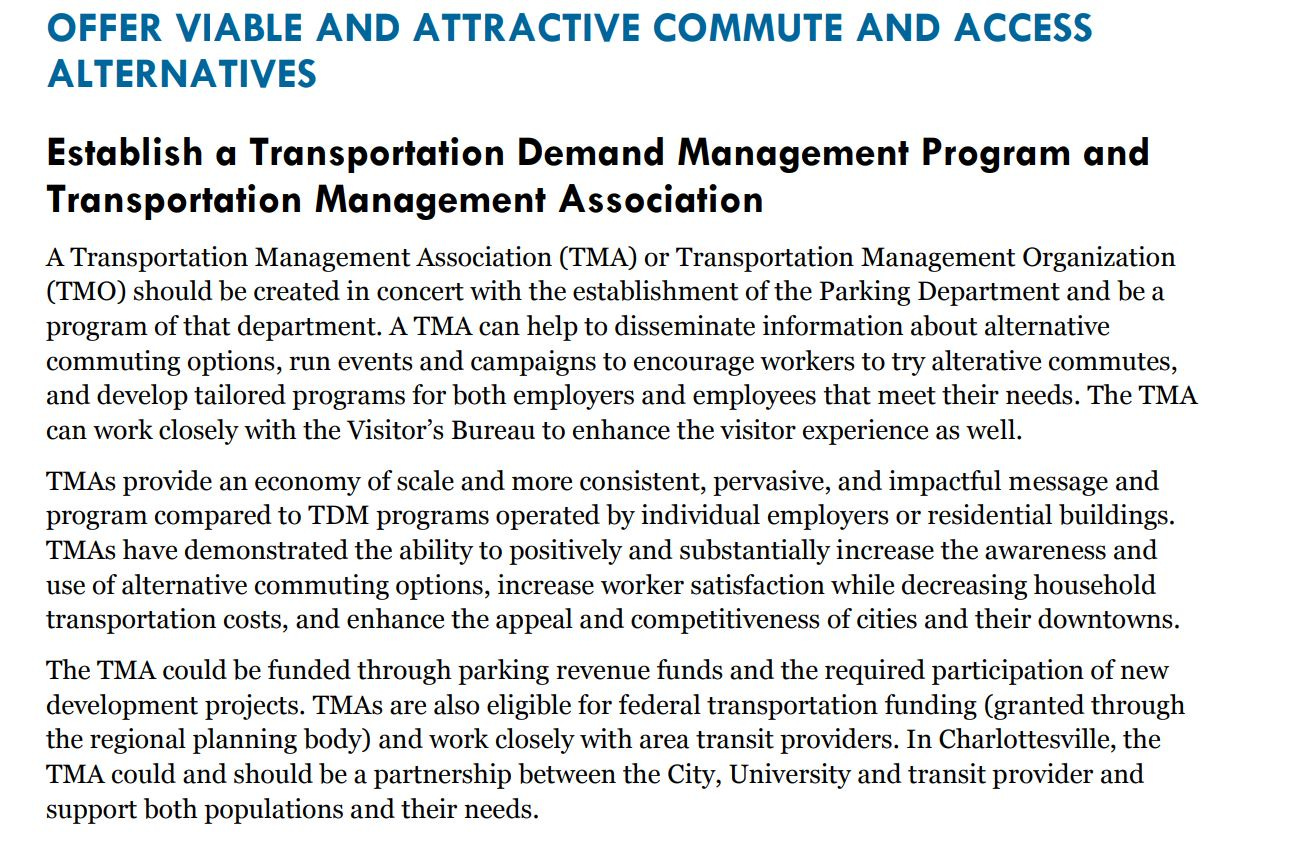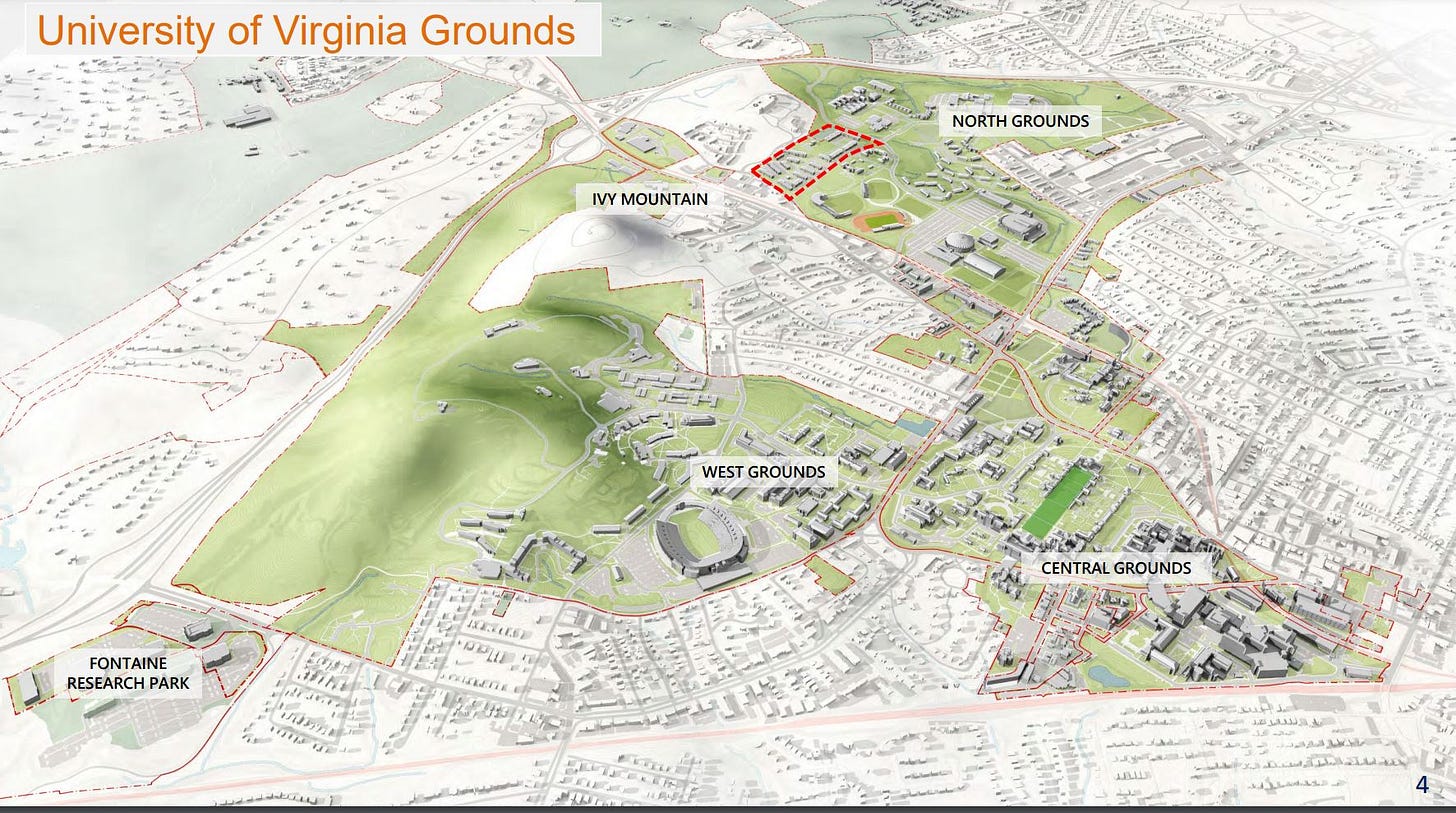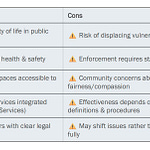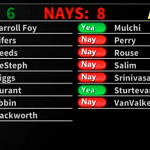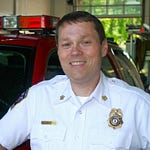In today’s Patreon-fueled shout-out: Help support Black-owned business in the Charlottesville area. Check out the Charlottesville Black Business Directory at cvilleblackbiz.com and choose between a variety of goods and services, ranging from beauty supplies, professional services, and e-commerce. Visit cvilleblackbiz.com as soon as you can to get started.
On today’s installment:
The slate is known for election day in Albemarle and Charlottesville
The University of Virginia’s board of visitors is briefed on the future of Ivy Gardens
A quick review of transit in the area, including a call for a new approach
Election returns are in for the Democratic primary in Virginia, and in Charlottesville, Juandiego Wade obtained the most votes with 4,910 in the unofficial count, with Brian Pinkston getting 3,601 votes. Carl Brown came in third with 1,797 votes, Wade and Pinkston raised a lot more money than Brown, with Pinkston reporting a total amount of $69,676 through May 27 and Wade reporting $68,670 for the same period. In contrast, Brown raised $1,675 according to data put together by the Virginia Public Access Project.
The two Democrats now go on to face two independents in the general election. Yas Washington had run as a Democrat but failed to qualify. She’s raised $315 so far this year. Incumbent Nikuyah Walker will also be running for a second term. She was the first independent to win since 1948.
In the primary for the Commonwealth’s Attorney race, incumbent Joe Platania fended off a challenge from Ray Szwabowski with 58.7 percent of the votes.
There were no contested primaries for local races in Albemarle, Fluvanna, Greene, Louisa or Nelson counties. In Albemarle, no Republicans or independents emerged to face three Democrats on the ballot. That means Jim Andrews, Ned Gallaway, and Diantha McKeel will all likely be elected for four-year terms without any opposition.
On Monday night, Charlottesville City Council officially adopted a resolution canceling a project to build a 300-space parking garage at the corner of East Market Street and 9th Street. Part of the decision hinged on a notion of whether the city was doing enough to get people out of their cars and into other modes of transportation.
In 2015, the firm Nelson Nygaard conducted a study of parking downtown, and one of the recommendations was to maintain existing supply through something called “transportation demand management.”
“Strong promotion of TDM efforts and continued enhancement of alternative travel options will serve Charlottesville well in maintaining its reputation and charm as an attractive, livable and sustainable city,” reads page 8 of the study, which was the most recent official review of parking downtown.
Specifically, the plan recommended creation of a “Transportation Management Association” to help encourage alternative modes of travel. In early 2008, local community member Randy Salzman brought the idea up to the Charlottesville-Albemarle Metropolitan Planning Organization (MPO). That’s the local body that makes decisions on regional transportation projects. Salzman arranged for them to hear from a professor of sustainability from Curtin University in Perth, Australia. Here’s Peter Newman, who co-authored a book with UVA professor Tim Beatley called Resilient Cities: Responding to Peak Oil and Climate Change.
“Now we’ve had all of our cities do regional plans in the last five years and they have all concluded the need for more sustainable future based on less car-dependence with transit prioritized with corridors and centers to make sure the structure of the city changes,” Newman said.
The idea at the time didn’t get much traction.
At the May 27 meeting of the Regional Transit Partnership — a sub-group of the MPO — Salzman once again appeared to promote the idea.
“We need to understand why people take the bus or don’t take the bus, why people bicycle or don’t bicycle, why people drive or don’t drive,” Salzman said. “There is another car culture that has done this exceptionally well and that culture is Australia where they have just as much of a car ownership culture as we have in the United States.”
Salzman mentioned a program called TravelSmart, which has now transformed into a program called Your Move. People who register are assisted in getting used to different forms of transportation. Salzman wants this community to take on the same approach, perhaps by expanding the existing RideShare program.
“Right now because of the stars aligning at the federal level, this area could go after a grant that would be the leadership for helping America,” Salzman said. “Understand the individuals and how we can help them change as opposed to building the change, building all the transit and then not using it.”
The Regional Transit Partnership consists of the University Transit Service, Charlottesville Area Transit, Jaunt, and other agencies. A non-voting member of the body is Sara Pennington, who runs the RideShare program as part of the Thomas Jefferson Planning District.
“Transportation doesn’t just work in a silo,” Pennington said. “There are so many moving parts and moving pieces and the more that we can work together and band together to help each other out, the better.”
Much of Pennington’s work this past year has focused on telework, which was crucial for many during the pandemic.
The TJPDC will soon hire a consultant to create a regional transit vision plan at a cost of $350,000, with half of that amount coming from a grant from the Virginia Department of Rail and Public Transportation. A selection firm is reviewing three proposals for the project and an announcement on who will do the work may be made later this month.
The TJPDC is also working on a $106,215 study about expanded transit in Albemarle County, above and beyond a second study that Charlottesville Area Transit is conducting to add service to U.S. 29 north of its current terminus at the Wal-Mart. Jessica Hersh-Ballering is a transportation planner and said the firm Michael Baker International has been hired to do the work.
“We are planning our first public engagement session for that project in late July or early August,” Hersh-Ballering said.
Karen Davis, the interim CEO of Jaunt, said her planning manager’s recent appearance at a Central Virginia Regional Housing Partnership panel discussion may lead to the resumption of a discontinued service between the North Fork Research Park and points south. Stephen Johnson talked about the possibility of on-demand transit at the May 20 event. (watch)
“I got a call from UVA Foundation talking about a service we had done for them that is right now discontinued, Park Connect, he was so well-spoken that they called me and said ‘hey, on-demand could actually meet our needs better than the model we were using,” Davis said.
Later this summer, Charlottesville Area Transit will begin a public period for proposed route changes. There’s a story about that on my archive site, Information Charlottesville.
You’re reading Charlottesville Community Engagement and it’s time for another subscriber-supported public service announcement. It’s becoming more and more safe to go out and check out live music. If you’re interested in going out and hearing people who have been waiting to get out and play, check out the Charlottesville Jazz Society and their running list of events! The Charlottesville Jazz Society is dedicated to the promotion, preservation and perpetuation of all jazz, and that the best thing you can do now is to go check out some music.
Last week, the University of Virginia’s Board of Visitors met, as did their Buildings and Grounds Committee. One of the items on the agenda was approval of a master plan for the redevelopment of Ivy Gardens, an apartment complex between Old Ivy Road and Leonard Sandridge Road that was built in the late 1960’s.
University Architect Alice Raucher explained the purpose of creating a master plan.
“It is in general always good to have a plan and physical master planning helps to set priorities to inform future plans,” Raucher said. “It often aligns limited physical resources with often equally limited financial resources and provides the opportunity for broad University and community engagement to create a shared vision.”
Ivy Gardens is made up of 17 acres and has 440 residential units close to North Grounds, Darden, the School of Law, and the Miller Center for Public Affairs, and the Center for Politics.
“In 2016, at the direction of the University, the Foundation purchased Ivy Gardens and although its structures are aging, the property is currently income producing with units that primarily house our graduate students in a low-density, automobile-oriented development,” Raucher said.
The proposed redevelopment plan would increase the number of units to 718 and would add about 46,000 square feet of academic space and 69,500 square feet for commercial uses. The latter would be clustered in a new Town Square that would front onto Old Ivy Road. To the immediate north would be a Residential Commons with different kinds of housing types. In the middle would be a Central Green. A pedestrian bridge would cross Leonard Sandridge Drive, allowing safe passage to Darden and the Law School.
The project would be phased.
“The success of this proposal does not depend on wholesale redevelopment,” Raucher said.
For more on the timing, let’s hear a question from Robert Hardie, the chair of the Buildings and Grounds Committee.
“From a density standpoint are you satisfied that, obviously greenspaces are wonderful and we need those, but we also need to provide enough housing for this area, for what’s going to a growing law school and a growing Darden School and other programs around that area,” Hardie said. “And secondly, can you give us a little about the time frame and how long this will take to come to fruition? Obviously it will be done in phases, but when we might see this start and when it might be complete?”
“Yes, Mr. Hardie, the density on this site is improved by 150 percent so we have not only the 440 units that currently are there but there’s an additional 250 or thereabouts,” Raucher said.
The Architect added that what was before the committee was a master plan, and not a schematic design for imminent building construction. She also said there’s no capital project yet associated with the area.
President Jim Ryan said the University has many projects it would like to work on.
“Increasing the supply of housing for second-year students remains a top priority,” Ryan said.
The committee voted on a resolution to approve the master plan. Afterwards, the group was given an update on plans to remove the George Rogers Clark statue on West Main Street.
“We are ready to move in to phase one of that work which is the removal of the statue,” said Colette Sheehy, senior vice president for operations and state government relations at UVA. “We’re prepared to an issue a [request for proposals] this month to a firm that would remove the statue and relocate it and store it.”
Sheehy said the cost to do the work will be around $400,000 and the work should be complete this summer. The second phase will be to engage with the indigenous community about what should be featured at the site in the future. (download the B&G presentation)
Before you go, thank you so much for reading. This is a free newsletter designed to spread information about this community. But, it’s also my full-time job! If you’re able to contribute financially, it will help me keep going well into the future.
To do so:
Take a look at my Patreon page, which needs a bit of a refresh. But, in general, this is the best way to support my overall research, which includes a lot of things that aren’t this newsletter.
Subscribe through Substack, which will compel Ting to make a matching contribution. I am grateful for their support of their community service, and I’d be grateful for yours, too.
You can send me cash through Venmo, which will also get you a benefit or two. What are they? Drop me a line and ask!
If you cannot support me financially at this time, send this on to people you think would be interested. The more I grow, the more content there will be.



